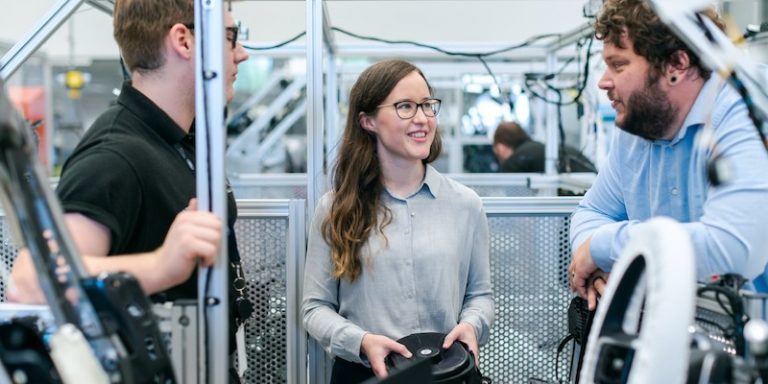
The Global Partnership on Artificial Intelligence (GPAI) was created to ensure the responsible development and use of AI, in line with the OECD Principles on AI. The GPAI experts are working on the creation of a “Living Lab” to better understand the practices of the future and which will be linked to a network of national physical “living labs” to measure the impact of AI through individual or shared experiences in companies.
Since its launch, the PMIA has brought together prestigious experts and formed four working groups including the “Future of Work” working group to conduct analysis on how the deployment of AI can impact workers, their environment, and how workers and employers can prepare for the future of work in order to preserve and even improve job quality, inclusion, health and safety at work.
Yuko Harayama, co-chair of the working group said:
“We are only at the beginning of the change in terms of the impact of artificial intelligence on working practices but this should not stop us from thinking about the future.”
In 2021, two projects were implemented on this theme: “Platform for observing AI in the workplace”, and “AI and fair work” The first aims to collect information on the impact of AI within companies. It has allowed to work on a catalogue of AI use cases in the workplace and within organizations that will be the source of in-depth studies. The second project is a concrete application of PMIA’s mission to bridge the gap between theory and practice.
The goal is to foster well-being at work through a human-centered approach and to inform decision-makers, both political and private sector, and create an equitable work environment.
The working group, while continuing to work on the first two projects, will launch a third in 2022 to design and implement a Living Lab on AI at work. This new project will provide a glimpse into the future of AI and complement the group’s work by increasing the opportunities for experimentation. Yuko Harayama states in this regard:
“This lab will allow sharing experiences to evaluate the impact of AI at the level of individuals but also companies that will have the opportunity to find information on the most effective way to deploy artificial intelligence and conduct virtual experiments to better assess its impact.”
The concept of “Living Lab”, born in the United States in the late 1990s, arrived in Europe in 2006 with “Living Labs Europe” to boost employment. It is a research methodology in innovation, the actors can be public or private and work in continuous dialogue.
The Living Lab proposed by the PMIA will be a virtual place, linking a network of national physical Living Labs where concrete experiences will be shared to assess the impact of AI at the individual and business level. This platform will provide information on effective deployment of AI to businesses, where they can conduct virtual experiments to better understand it. In addition, it will offer expert assistance and a catalogue of guidelines for the use of AI. Employees will be able to experience and share AI.
In a first phase, in 2022, the Living Lab will be built as a website
accessible from both mobile phones and laptops with search functionality and a variety of content: real-life case studies (or links to them) taken from the AI in the Workplace observation platform, another project the panel is currently working on. The content will be:
- Use cases included in the AI in the Workplace Observation Platform,
- Additional use cases for specific areas, e.g. chatbots, a video library and learning/training resources. Preliminary implementation of Augmented Reality/Virtual Reality (AR/VR) – in display capacity only – will provide the same functionality as the future interactive platform,
- Reports, publications and national Living Lab initiatives on the future of work in PMIA member countries.
Students will be recruited to join the PMIA Junior Investigators to assist in this development phase.
In a second phase, from late 2022 to mid-2023, the project will include the design and development of a prototype interactive platform with resources, open to anyone to develop their own AI strategies, whether it be chatbots, virtual or augmented reality, skills/learning or task/skill/position redefinition that can have a broad international impact.
In the second half of 2023, a collaborative platform will be built from the previous interactive platform and it will include:
- Functionalities for the exchange of ideas by different communities of interest/practice and the development of AI communities.
- Online spaces for collaboration on projects (these projects may be screened before approval)
Yuko Harayama comments:
“Beyond a source of information, we hope that the Living Lab will also be a source of inspiration for actors involved in AI and will offer perspectives on the diversity of practices according to countries.”
“Our approaches are similar as we are, these companies need to test their ideas and the lab will be able to offer them the opportunity to do so.”
Translated from Impact de l’IA dans le monde du travail : le Living Lab du PMIA pour mieux appréhender les pratiques









